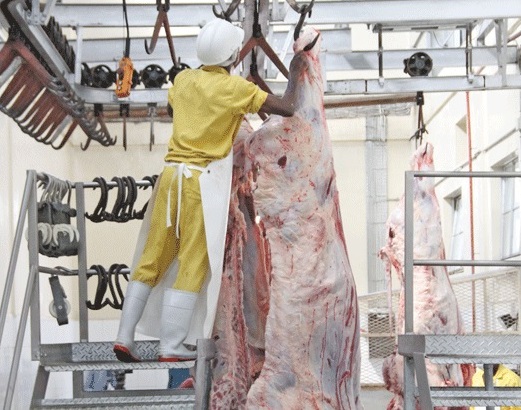Chapo invites African businesses to invest in LNG Project logistics
Deputy Health minister visits Maputo slaughterhouse, pledges to step up meat inspection

Jornal Notícias
Meat consumed in the greater Maputo area is transported to and from the municipal slaughterhouse in unhygienic conditions which the Health Ministry wants to see improved.
Deputy Health Minister Mouzinho Saide made a surprise visit to the slaughterhouse on Friday and deplored the transport conditions. Most of the livestock farmers who take their cattle to the slaughterhouse do so in open vehicles, exposed to heat and to dust.
Even worse, the owners ignore the recommendation that the animals, once killed, should remain in a cold store for at least 24 hours before being taken for sale to the final consumers. Although the slaughterhouse has cold storage facilities, the owners of the cattle do not use them. Instead they take the meat for sale as soon as it has been processed.
Saide promised that the Health Ministry will work with the Veterinary Services and with Maputo Municipal Council to ensure that all public health measures for the slaughterhouse are complied with.
Saide also wanted tighter measures against falsification of the stamp which the municipal slaughterhouse puts on all meat it has processed and inspected. This, he believed, would end the proliferation on the market of uninspected and potentially dangerous meat, which might transmit to human consumers animal diseases, such as bovine tuberculosis.
“We were informed that there may be falsification of the identification of animals inspected here”, said Saide. “The veterinary services have an identification process though a stamp used on inspected meat, but this may be falsified in the places where meat is sold”.
Saide said that anyone who sells meat has a duty to ensure that it has been inspected and is free of disease.
He found that the slaughterhouse, which dates from the 1930s, handles about 50 head of cattle a day, and generally observes all the international norms governing slaughterhouses, including ensuring that the animals do not suffer unnecessarily.
“This is a modernised process, which obeys international standards”, said Saide. The slaughterhouse had a good health record, with no cases of bovine tuberculosis recorded. Internationally, it is thought that around ten per cent of cases of human tuberculosis derive from bovine tuberculosis.
Carlos Soeiro, the manager of Soeiro Comercial, the company to which the Municipal Council has leased the slaughterhouse told the Deputy Minister he was concerned at the condition of the cattle brought to the premises. He said the animals from peasant livestock farmers arrive very thin, which compromises the quality of the meat.
The situation is much better with commercial cattle ranchers, who bring animals which are well fed and weigh up to 450 kilos.
Soeiro also warned that farmers pay far too little for the use of the slaughterhouse. The current fee is only five meticais (about 11 US cents) per kilo of meat. Two years ago a study warned that the business would only be profitable with a fee of 13 meticais per kilo.
At the time of the study the fee was only three meticais. It was increased by two thirds, but this still remained what Soeiro called “a social fee”, which did not meet the real costs of the slaughterhouse.
Soeiro added that any diseased animals are destroyed, so that their meat cannot be sold, and their owners are informed of the problem.












Leave a Reply
Be the First to Comment!
You must be logged in to post a comment.
You must be logged in to post a comment.